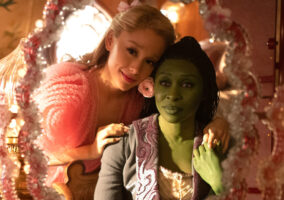Fine. We were wrong. We admit it. We thought Charleston was going to be a trap set for the Second Mass by the aliens. Instead it  was something we really should have seen coming; a story that practically every post-apocalyptic tale of any worth needs to tell: other humans are the worst enemies of all.
was something we really should have seen coming; a story that practically every post-apocalyptic tale of any worth needs to tell: other humans are the worst enemies of all.
It’s hard to do a story like this one without lapsing into cliche. Certainly, there was a “checking items off a list” feel to the proceedings, from the disarming of the Second Mass, to their rocky integration into the group, to the moment when it looked like they were all going to be herded off to jail cells, it’s all somewhat expected, once you know where the story’s going. But like we said, this is an aspect of poct-apocalyptia that always needs to be addressed at some point and perhaps the familiar tropes can’t be avoided. In a subversive twist that says more about modern politics than the show is probably prepared to explore, our would-be dictator (a very welcome Terry O’Quinn, late of Lost) is a history professor who has modeled his new society entirely on the classic American democracy as envisioned by Thomas Jefferson and embodied by George Washington. In most post-apoc stories, the learned are the good guys and the strong implication is usually that with ignorance comes fear, which in turn spurs on violence. In other words, the standard lesson is that knowledge begets civilization; ignorance begets anarchy.
In this version of the tale, it’s knowledge that comes in for some criticism; more specifically, how knowledge can be t wisted in order to achieve an end and, more nuanced, how knowledge can beget fear just as well as ignorance can. “President” Manchester, with his suits and his well-appointed office, stacked high with books (hoarding of knowledge), is paralyzed by his fear of the enemy and argues instead for all energies to be poured into forming a new society; one at which he sits as the head and the unquestioned leader. It’s classic egotism wrapped up in good intentions and a PhD, and thus, makes for a nicely unexpected take on this kind of story.
wisted in order to achieve an end and, more nuanced, how knowledge can beget fear just as well as ignorance can. “President” Manchester, with his suits and his well-appointed office, stacked high with books (hoarding of knowledge), is paralyzed by his fear of the enemy and argues instead for all energies to be poured into forming a new society; one at which he sits as the head and the unquestioned leader. It’s classic egotism wrapped up in good intentions and a PhD, and thus, makes for a nicely unexpected take on this kind of story.
Even better, the Second Mass was not presented as the righteous heroes in this scenario. Instead, we saw them from the perspective of the Charlestonians: dirty, violent, and tainted by alien contact, making them untrustworthy. Knowing that Tom was abducted and then let go doesn’t quite absolve Manchester of his actions, but putting yourself in his shoes, it does explain why he would find Tom a questionable ally. Of course, he didn’t find him questionable at all when he thought Tom was going to back his side. It was only when Tom started challenging his autho rity that he suddenly became an enemy of the state. Again: classic egotism fucking up good intentions.
rity that he suddenly became an enemy of the state. Again: classic egotism fucking up good intentions.
And finally, the story went off in a slightly unexpected direction, but one that makes perfect sense in terms of real-world politics; namely, that burgeoning dictatorships are highly unstable forms of government and far more likely to spur a coup than more established forms of government. And in a final nice twist, it’s not Tom who’s in charge of the coup – or anyone else in the Second Mass. They found themselves smack in the middle of a simmering argument and wound up setting it off. Personally, we kind of miss seeing the alien action, but this is a story that needs to be told in this world and we appreciate that it’s being told fairly well.
Also: Anne got to be all bad-ass with a snotty heart surgeon. That was nice.
Very much looking forward to next week’s finale. We want things to get all explodey before the end.
Dallas: Revelations Next Post:
Falling Skies: The Skies are Falling
Please review our Community Guidelines before posting a comment. Thank you!



